What makes a suitable puppy food?
Feeding your puppy and feeding your adult dog are two different things. It’s important you know what to look for in the best puppy food brands, as your puppy’s needs will change throughout his development. Whether you’ve got a small, toy breed, a large breed or a giant breed puppy, the healthiest puppy food will always be designed to give them around twice as much energy as a good grown-up dog food. 
Calories are pretty high on the list of things you should look at in a reputable puppy food brand. Alongside healthy amounts of protein and fat, you’ll also need to consider all the vitamins and nutrients for growth. These can be tricky to understand at first, but don’t worry! We love puppies as much as you, so we’ve considered the most important things you should look for when choosing the best wet or dry puppy food.
Quick Review: Top-5 Dog Foods for Puppies
What’s in the best puppy food ?
High Protein
Your little puppy is definitely going to need 25% to 30% protein, regardless of his breed. This is higher than what adult dogs need, as puppies are in a growth period where they’re building muscle super fast! The best puppy food will give your puppy this protein from real meat, so the first thing to look for is a main ingredient like chicken or fish.
At the same time, you should look for puppy food without high levels of artificial ingredients like colors, flavors or preservatives. Really great brands will often make only the best puppy food that’s designed by expert nutritionists and completely free of artificial ingredients.
Fat
Your puppy’s calories should come from fat as well as protein, and different puppies will need different amounts of fat. You’ll do your pup a big favour by choosing puppy food that’s right for his specific breed size, as the best puppy food for his breed will be designed with this in mind. Typically, smaller breed puppies grow faster than their large or giant breed friends and require more fat in their puppy food. The larger your puppy, the less fat he’ll require per unit of body weight, because giant and large breeds will grow slower.
The best puppy foods will usually contain something that either adds more or takes away from 8% depending on the different needs of your specific breed. Look out for this when choosing, as the best food for puppies will often be designed for your little friend’s particular breed.
Carbohydrates
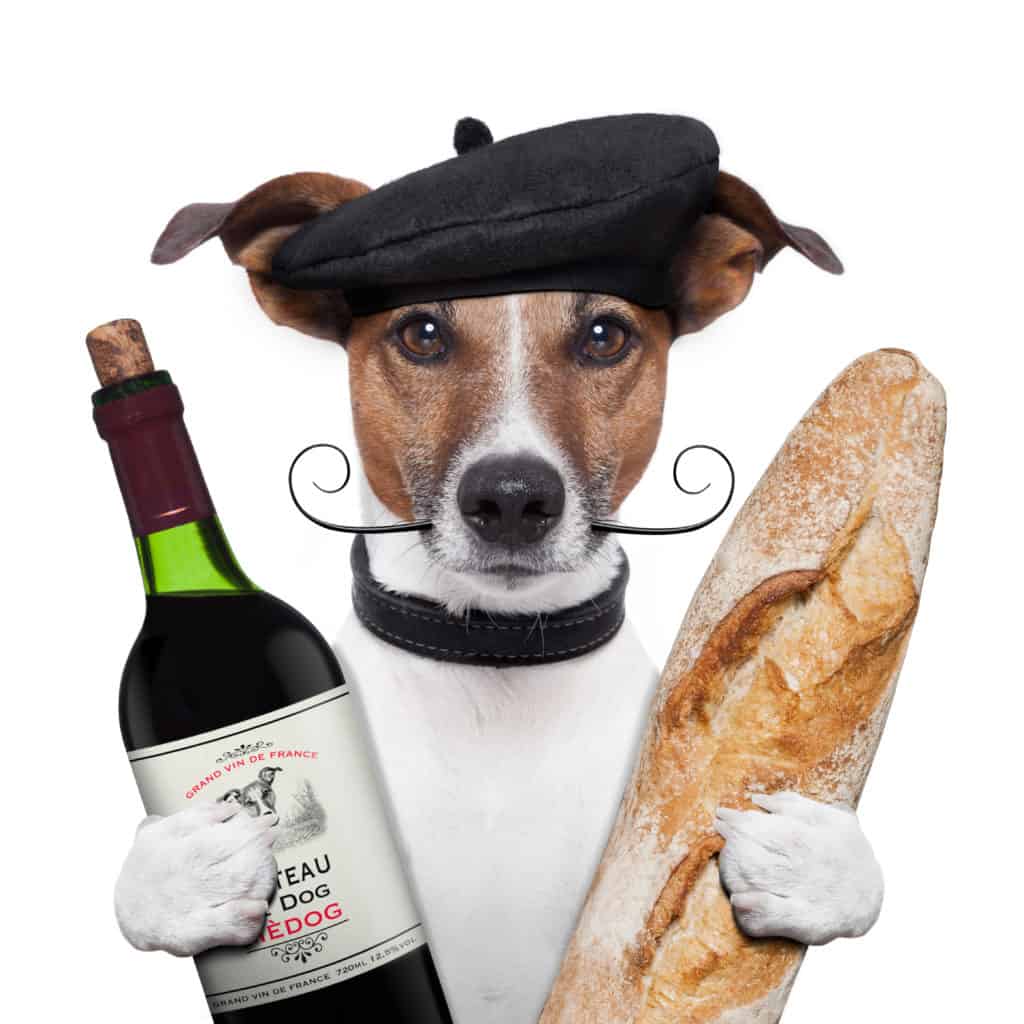 Carbohydrate content will generally be something to consider for quality, rather than percentage level when it comes to dog food. Dry dog foods and dry puppy foods are usually going to contain anywhere between 30 and 70% carbohydrates, which gives your puppy’s kibble it’s structure. It’s best though, to always look for something at the lower end of this range. Lower is better, because scientifically, our dogs and puppies do not need carbohydrates to thrive.
Carbohydrate content will generally be something to consider for quality, rather than percentage level when it comes to dog food. Dry dog foods and dry puppy foods are usually going to contain anywhere between 30 and 70% carbohydrates, which gives your puppy’s kibble it’s structure. It’s best though, to always look for something at the lower end of this range. Lower is better, because scientifically, our dogs and puppies do not need carbohydrates to thrive.
When shopping around or reading puppy food reviews, look for a puppy food that has most of its carbohydrates from healthy sources. The best puppy food brands will usually make sure to include quality ingredients like sweet potato or leafy vegetables. This means any carbohydrate in your puppy’s food is serving a purpose and acting as a source of healthy vitamins.
Calories
Small, large and giant breed puppies will require different amounts of calories each day. You’re more likely to find a suitable energy content if you choose a dog or puppy food designed for your specific breed, or at least your puppy’s size range. We’ve already mentioned that puppies will usually need about twice the daily calories of an adult dog, but it’s good to have a guideline in mind so you can pick the best puppy food for your little friend.
Generally, vets often recommend that different puppy breeds get the following daily energy intake from their fat, protein and carbohydrates:
- Small breeds which will reach up to 20 pounds on adulthood like Toy Poodles or Pomeranians should be eating about 1200 calories daily, although this will be less for toy puppies that are smaller
- Large breeds will usually weigh more than 50 or 60 pounds, but less than 90 pounds at full size. They’ll need more than small and medium puppies, so you’ll want to look for something that will total between 2000 and 3300 calories a day over 3-5 mealtimes.
- Giant breed dogs like St Bernards and English Mastiffs will typically grow up to be over 90 pounds, so you’ll be looking at something around the 3500 mark in the best dog food.
In all cases, it’s important that you don’t take these caloric guidelines as a rule. Each dog will have different requirements depending on their specific breed and perhaps more importantly, their daily activity level. Super active puppies will require more energy and therefore kCals each day, as they’re burning more while they grow and have fun.
How do I choose between dry food and wet food?
Dry puppy food and wet puppy food have different characteristics, so the ideal ratio will vary depending on your puppy’s age and eating habits. Because there’s no one ‘best’ when you’re choosing between wet and dry foods, there are pros and cons of each that you should consider when feeding your growing puppy.
The main things to consider when deciding between wet and dry foods are moisture and variety. Wet foods have much higher water content than dry foods, meaning puppies who don’t drink lots can often benefit from having wet food mixed into their dry puppy food. It’s really important to make sure your puppy gets enough moisture, so if he’s not yet toilet trained you might want to take him outside shortly after he eats. 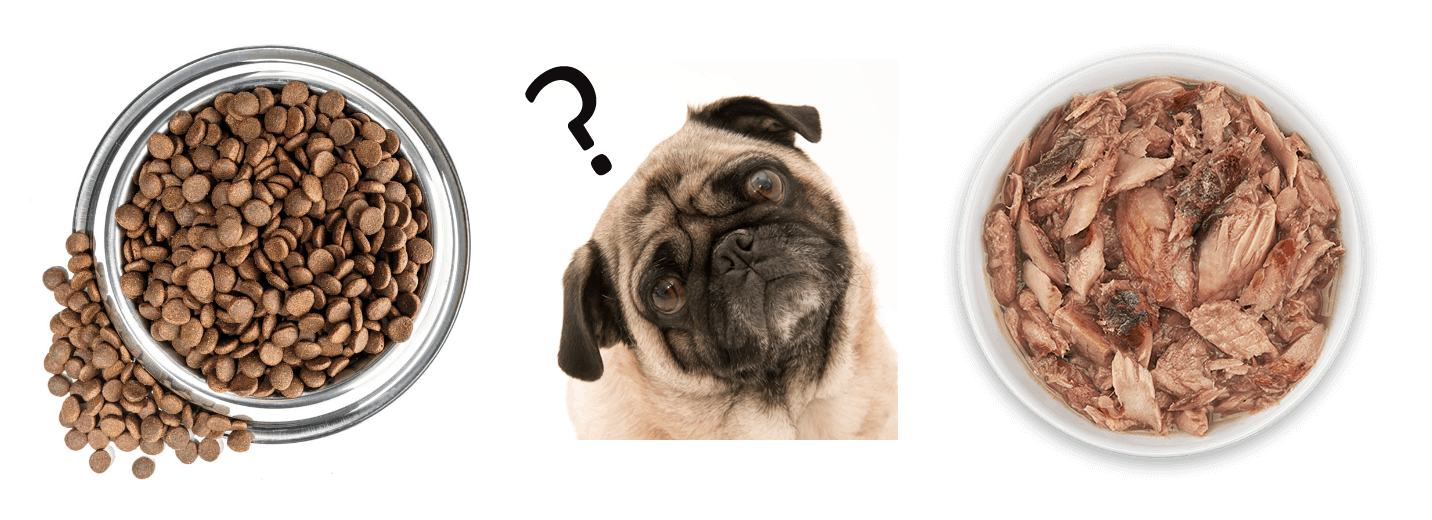
Dry puppy foods and dry dog foods are often a more economical choice. They last longer in storage and don’t spoil after a few days like wet puppy foods. The best dry puppy food will also help keep those little teeth healthy because kibble structure is often carefully designed to help fight tartar.
All puppies are unique, and some will prefer wet food to dry. A great way to find out the best ratio for your puppy is to mix in some wet food with his dry puppy food, and watch his physical reactions. The top rated puppy foods will typically give you clear instructions on the ratios you should use when mixing the two. Remember, variety can be a good thing and this applies to puppies too, so give your little friend a change once in a while as a treat!
When can a puppy switch to adult food?
Most puppies will need to eat a puppy diet until they are 9 – 12 months of age. Some veterinarians say that smaller breeds can switch to adult food at 10 months since they’ve completed the majority of their growing, while large breed dogs will need a puppy diet until they reach 1 year of age.
In order to be safe, it’s best to just offer your puppy a quality puppy diet until they;ve reached 1 year of age. Once they are ready to switch over, be sure to gradually change their food over a 2 week period to avoid an upset stomach.
Top brands of puppy food
How do I know a good puppy food brand when I see one?
There are several brands that make the best food for puppies, and unsurprisingly these are the same brands making the best dog food! We have several favorites that always deliver when it comes to quality ingredients and balanced nutrient profiles for your puppy.
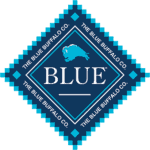 Natural food is number one with Blue Buffalo. In fact, these American producers started up uniquely to make the healthiest puppy food around and believed top quality, natural ingredients were the way to go. Since they were founded over ten years ago, they’ve developed a range of top puppy foods in varieties like homestyle and chicken with garden vegetables.
Natural food is number one with Blue Buffalo. In fact, these American producers started up uniquely to make the healthiest puppy food around and believed top quality, natural ingredients were the way to go. Since they were founded over ten years ago, they’ve developed a range of top puppy foods in varieties like homestyle and chicken with garden vegetables.
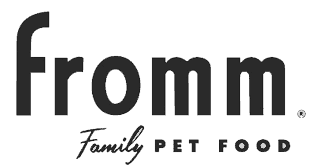 Family-owned Fromm rate food safety very highly, in the same way that quality products are at the top of their list of priorities for the best dog food. Fromm believe that the best dog food for puppies is grain-free and has real meat as the main ingredient. They also do a nice variety of different flavours, which are created to give your dog some choice.
Family-owned Fromm rate food safety very highly, in the same way that quality products are at the top of their list of priorities for the best dog food. Fromm believe that the best dog food for puppies is grain-free and has real meat as the main ingredient. They also do a nice variety of different flavours, which are created to give your dog some choice.
 Award-winning Orijen have been one of our favourites and on our healthiest puppy food throughout all our puppy food reviews. They use regional ingredients in their products, which means that you’ll always be buying all-American puppy food that is never outsourced. Orijen actually receive daily ingredient deliveries from local sources and these ingredients are so fresh that it usually within their foods in under five days.
Award-winning Orijen have been one of our favourites and on our healthiest puppy food throughout all our puppy food reviews. They use regional ingredients in their products, which means that you’ll always be buying all-American puppy food that is never outsourced. Orijen actually receive daily ingredient deliveries from local sources and these ingredients are so fresh that it usually within their foods in under five days.
 Kirkland are best known for being CostCo suppliers of Nature’s Domain puppy and dog foods that come in completely grain-free varieties. They make puppy food from high quality sources, so your dog or puppy is only eating the best nutrients. They also make the best food for puppies because they pay attention to Omega fatty acids and amino acids for optimum health.
Kirkland are best known for being CostCo suppliers of Nature’s Domain puppy and dog foods that come in completely grain-free varieties. They make puppy food from high quality sources, so your dog or puppy is only eating the best nutrients. They also make the best food for puppies because they pay attention to Omega fatty acids and amino acids for optimum health.
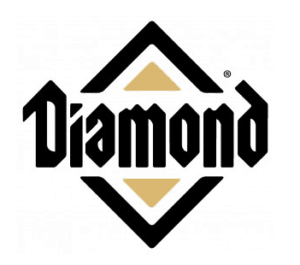 Diamond are one of our top rated puppy brands because they design beneficial bacteria that’s especially made to help our pets digest food in a smooth and simple way. Every puppy food Diamond makes is manufactured here in the States, and they use a lot of quality meat. From pasture-raised lamb to wild-caught fish, Diamond are on our list because they make very, very healthy puppy food.
Diamond are one of our top rated puppy brands because they design beneficial bacteria that’s especially made to help our pets digest food in a smooth and simple way. Every puppy food Diamond makes is manufactured here in the States, and they use a lot of quality meat. From pasture-raised lamb to wild-caught fish, Diamond are on our list because they make very, very healthy puppy food.
 IAMS started making pet food in 1946, and the pawprint logo you’re probably familiar with was first made famous in the 1970s. IAMS have a rock solid nutritional philosophy which puts protein right at the heart of all the best food for puppies, and we think they get extra brownie points for their charitable work rescuing pets and giving them homes.
IAMS started making pet food in 1946, and the pawprint logo you’re probably familiar with was first made famous in the 1970s. IAMS have a rock solid nutritional philosophy which puts protein right at the heart of all the best food for puppies, and we think they get extra brownie points for their charitable work rescuing pets and giving them homes.
 Hill’s was inspired in the 1930s by a guide dog called Buddy, whose owner believed that Buddy’s kidney problems were the result of the poor nutrition content of dog food at the time. Wanting to create dog and puppy food that would help other dogs from poor nutrition, he developed Hill’s dog and puppy foods in his own kitchen.
Hill’s was inspired in the 1930s by a guide dog called Buddy, whose owner believed that Buddy’s kidney problems were the result of the poor nutrition content of dog food at the time. Wanting to create dog and puppy food that would help other dogs from poor nutrition, he developed Hill’s dog and puppy foods in his own kitchen.
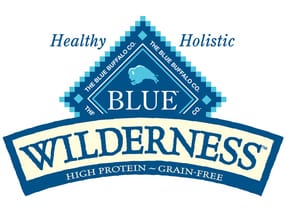 Blue Wilderness is actually a specially designed line of dog foods that is owned by Blue Buffalo. We believe it deserves a special mention because Blue Wilderness puppy food is grain-free all the time and very high in proteins. It’s designed around the diet that wolves get in the wild, so it’s got everything in the right proportions for a strong, growing puppy.
Blue Wilderness is actually a specially designed line of dog foods that is owned by Blue Buffalo. We believe it deserves a special mention because Blue Wilderness puppy food is grain-free all the time and very high in proteins. It’s designed around the diet that wolves get in the wild, so it’s got everything in the right proportions for a strong, growing puppy.
 Royal Canin was founded in 1968 by vets, and their US manufacturers are based in Missouri and South Dakota. In our opinion, Royal Canin makes some of the best food for puppies because all their formulas are scientifically based, meaning they work up from nutrient profiles to create tasty dog foods. Great for healthy puppies!
Royal Canin was founded in 1968 by vets, and their US manufacturers are based in Missouri and South Dakota. In our opinion, Royal Canin makes some of the best food for puppies because all their formulas are scientifically based, meaning they work up from nutrient profiles to create tasty dog foods. Great for healthy puppies!
 Wellness is one of our top puppy food brands because we’ve found that they focus very much on cutting out artificial fillers like meat and poultry by-product meals. They’ve only been around since the 90s, but this hasn’t stopped them from quickly becoming popular with vets across America for making puppy food that’s full of antioxidants and nutrients.
Wellness is one of our top puppy food brands because we’ve found that they focus very much on cutting out artificial fillers like meat and poultry by-product meals. They’ve only been around since the 90s, but this hasn’t stopped them from quickly becoming popular with vets across America for making puppy food that’s full of antioxidants and nutrients.
 Nutro have been making some of the best dog and puppy food out there since for almost a century, since 1926 to be exact. Nutro includes farm-raised meat in their products, relying purely on natural ingredients to create healthy, top quality puppy food. Their dry dog food manufacturers in the States can be found in Tennessee and California.
Nutro have been making some of the best dog and puppy food out there since for almost a century, since 1926 to be exact. Nutro includes farm-raised meat in their products, relying purely on natural ingredients to create healthy, top quality puppy food. Their dry dog food manufacturers in the States can be found in Tennessee and California.
 Purina is also an all-American brand, which was established in 1984. Quite soon after they set up their first pet care and nutrition facility near Missouri. Purina’s charity initiative Pets for People has over 150 shelters across the states to help senior citizens adopt pets cheaper, which we think is pretty impressive.
Purina is also an all-American brand, which was established in 1984. Quite soon after they set up their first pet care and nutrition facility near Missouri. Purina’s charity initiative Pets for People has over 150 shelters across the states to help senior citizens adopt pets cheaper, which we think is pretty impressive.
So, which is the healthiest food for puppies?
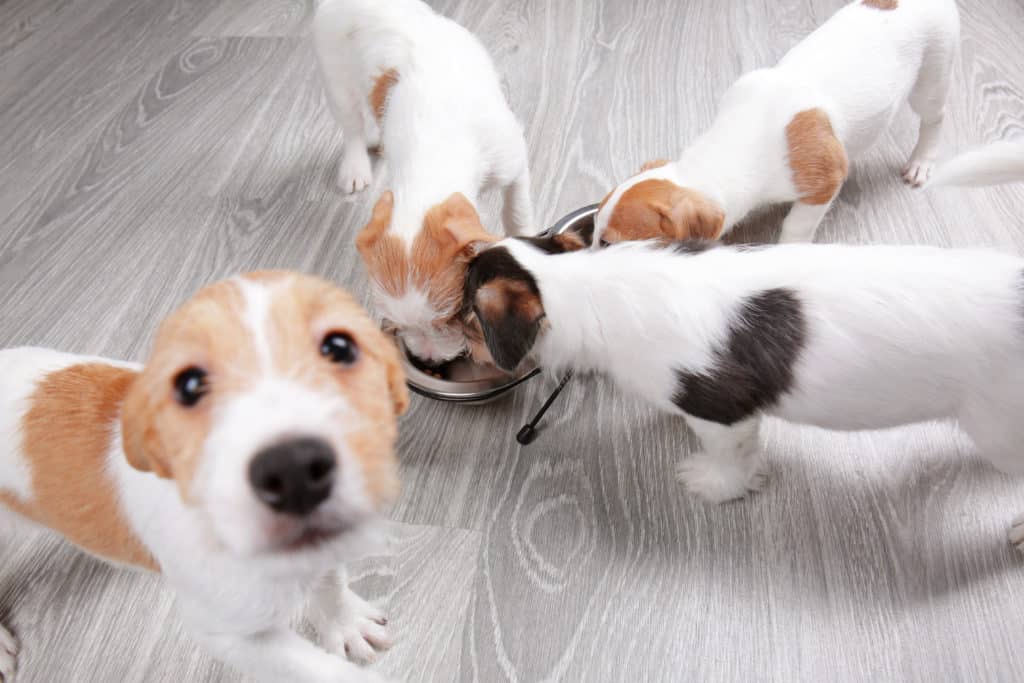 We’ve done the research for you on what we think the 15 best dog food for puppies are, no matter how big or small! Whether your best friend is a small pooch or a playful giant, we chose and compared only the best brands based on all the dietary requirements we’ve outlined for you.
We’ve done the research for you on what we think the 15 best dog food for puppies are, no matter how big or small! Whether your best friend is a small pooch or a playful giant, we chose and compared only the best brands based on all the dietary requirements we’ve outlined for you.
Best food for small breeds of puppies
- Hill’s Science Diet Small & Toy Breed
Pros
- It’s free of artificial colors, preservatives or flavors, meaning your small puppy is eating high quality ingredients
- All DHA comes from fish oil, a natural rather than synthetic source for your puppy’s nervous system health
- It has calcium for bone development, which is super important for smaller dogs
- Has Omega 3 and 6 for beautiful shiny coats, perfect for Chihuahuas, Dachshunds many Terriers and other long-haired breeds especially
- Contains broccoli, apples, green peas and loads of other natural green veggies
Cons
- Made with wheat, corn and other grains
- Contains corn gluten meal as a filler ingredient
- At 25%, it has a little less protein than other brands
- Diamond Naturals Small Breed Puppy Dog Food
Pros
- Averages about 419 calories per cup, perfect for small but growing puppies
- It’s got no artificial colors, flavors or preservatives
- It’s designed to include superfoods and healthy veggies like kale, spinach and even blueberries for phytonutrients and vitamins
- At 22%, it’s got a good, healthy amount of fat for your small or toy puppy’s growth
- Contains DHA for your puppy’s eye and brain development
Cons
- It contains egg product, making it unsuitable for puppies with egg sensitivities
- Wellness Complete Health Natural Small Breed Puppy Food
Pros
- Great protein content of 28%
- Calcium and phosphorus are well-balanced, with at least 1.5% calcium for healthy bones
- Deboned turkey is the number one ingredient, so your puppy’s protein is coming from a healthy source
- Contains antioxidants and vitamins from spinach and blueberries
Cons
- A little lower than the other small breed puppy food brands we’ve looked at with 19% fat
- Blue Buffalo Life Protection Formula Small Breed Puppy Dog Food
Pros
- Contains no corn, wheat or soy
- It’s made without artificial preservatives, flavors or colors
- Made with spinach, pumpkin, blueberries, kelp and loads of other real veggies
- Deboned chicken is the main ingredient and it gives your puppy 27% protein
Cons
- It’s also a little low in fat, at 16%
- Royal Canin Size Health Nutrition X-Small Puppy Dog Food
Pros
- With 430 calories in each cup, like the other brands it’s designed to make sure your small breed puppy gets all his energy for quick and healthy growth
- An awesome 18% fat, perfect for toy puppy breeds
- It’s calorie content is specifically designed for toy breed puppies, who grow the fastest
- 29% protein, so super protein rich!
Cons
- Although it’s our favourite for protein content, the main source of this is chicken meal rather than deboned or cafe-free chicken
- Contains corn, corn gluten meal and wheat gluten
Best food for large breeds of puppies
- Diamond Naturals Large Breed Puppy Dog Food
Pros
- 27% protein guaranteed for healthy, lean muscle development
- 15% minimum fat, again a winner for large dogs
- Perfectly balanced calcium-phosphorus levels, with 1.2% minimum calcium for teeth and bones
- Pasture-raised lamb means it’s naturally and responsibly sourced meat
- Another winner when it comes to superfood content, meaning cancer-fighting antioxidants for your large breed puppy
Cons
- It’s really a very premium end puppy food, so it’s a little pricier than some other brands
- Hill’s Science Diet Large Breed puppy food
Pros
- Free from artificial preservatives, colors and flavors
- Contains anti-oxidants from natural sources like flaxseed
- Another great large breed puppy food with real veggies
- It’s got glucosamine and chondroitin for joints, a real pro for large breed dogs
- Egg-free
Cons
- Has corn and corn gluten meal
- Nutro MAX Large Breed Puppy Recipe
Pros
- 26% protein from farm-raised chicken
- Avoids chicken by-product meal, a common filler in lower quality puppy foods
- Glucosamine and chondroitin help joint development and maintenance
- 14% fat, which is great for large breed puppies
- No genetically modified ingredients
Cons
- This one’s very hard to fault, as it’s economical and doesn’t even contain eggs!
- Eukanuba Puppy Large Breed puppy food
Pros
- Contains DHA, like most of the best puppy foods
- Filler-free
- Made with chicken poulet for 26% protein
- Another winner for large breed puppies with 14% fat
- 337 kCal per cup means it’s good for regular mealtimes
Cons
- While it’s perfectly balanced phosphorus and calcium like all the best dog food for puppies, the calcium’s a little low at 0.65%
- Wellness Complete Health Natural Dry Large Breed
Pros
- One of the best for protein content, with 29% guaranteed protein
- Another puppy food with higher recommended levels of calcium, 1.3% guaranteed
- Made with spinach, blueberries and flaxseed, so yet another great one for antioxidants and vitamins
- No meat by-products at all!
- No wheat, corn, soy
- No artificial flavors, colors or preserving agents
Cons
- This is another one that’s really difficult to find fault with, sorry!
- Iams Proactive Health Smart Puppy Large Breed Dog Food
Pros
- No wheat or soy
- The best thing is that real, farm-raised chicken is used in this puppy food
- No artificial preservatives
- It’s got loads of real fruit and veggies, another sign of a good dry puppy food
- 399 kCal in each cup, with a super useful feeding guide like all the top rated puppy foods
Cons
- Contains egg
- Blue Buffalo Life Protection Formula Large Breed Puppy Dog Food
Pros
- The flavors, colours and preservatives are always all-natural with Blue Buffalo
- It’s got great oxidative balance, meaning its got vitamins, antioxidants and minerals in carefully designed amounts
- Smaller kibble size to avoid overeating, something to look out for with large breed puppies
- Rough kibble surface fights tartar, so hopefully your puppy won’t be breathing too much doggy breath when he comes for a hug!
- Like the small breed puppy version, it ’s formulated with specific puppy size types in mind, so contains 28% protein for growth
Cons
- The 14% fat content is at the higher end of the recommended level for large puppies, so make sure you’re walking your puppy enough!
Best food for giant breeds of puppies
- Holistic Select Natural Grain Free Dry Dog Food
Pros
- Holistic select have gone out their way to make this puppy food good for regular, trouble-free digestion by using digestive enzymes, a smart move for giant breeds
- Over 27% protein, and giant breeds need a lot of lean muscle
- Free from artificial preserving agents, flavors and colors
- No wheat or wheat gluten
- No meat or poultry by-products at all
- It’s got only a 4-day transition if you’re switching up puppy food brands in a hurry
Cons
- 16% fat is a little high for giant breeds puppies, though still inside recommended levels
- Royal Canin Puppy Giant Dry Dog Food
Pros
- With 32% protein, this packs the biggest punch of all the puppy foods we’ve looked at so far!
- It has glucosamine, alongside chondroitin and DHA for healthy joints, which is important in giant breeds
- It has 340 calories in each cup, so that even the hungriest puppies won’t be overeating
- Because it’s designed for giant breed puppies who grow slower than small breeds, it’s suitable for puppies up to 8 months old
Cons
- Made with chicken by-product meal
- Contains corn, corn gluten meal and wheat gluten meal
- Eagle Pack Natural Pet Food
Pros
- Fat is 12%, well within the recommended guidelines for much larger puppies
- The special blend of minerals packs in 1.5% calcium, at the higher end of the scale to promote solid bone development
- Has salmon oil with Omega 3 for glossy coats and more importantly, DHA for eye and brain growth
- Egg free
- Contains Vitamin B12 for energy release, making bouncy happy giant puppies!
Cons
- Doesn’t have any leafy green vegetables or natural fruit
Best wet puppy food
- Hill’s Science Diet puppy food
Pros
- It’s got a little less protein than other brands, but at 8% it’s still very much one of the healthiest puppy foods we analysed for our puppy food reviews and when moisture isn’t considered this totals 28%!
- Nutrient profile exceeds Association of American Feed Control Official standards
- Because it’s so protein-rich, it’s great for maintaining a healthy puppy body weight
Cons
- Contains corn and meal from soybeans
- Blue Buffalo Homestyle Natural Puppy Wet Dog Food
Pros
- Has puppy-friendly vegetables for vitamins and happy little doggies
- No corn, soy or wheat thickening products or fillers
- No artificial flavors, preservatives or colors as per Blue Buffalo’s high standards
- No by-product meals
- Natural DHA from fish oils
Cons
- None we can find! It’s right up there on our ‘best dog food for puppies’ list! Woof woof!
- Purina Pro Plan Pate Wet Puppy Food
Pros
- It’s awesome to find a wet puppy food with more real meats than water content. And because it’s got loads of chicken, liver and salmon, it’s full of high-quality ingredients
- With 10% protein, it’s higher than some of the other best puppy food brands
- This wet puppy food is quite economical, and that’s great because wet foods are often more expensive than dry puppy foods
Cons
- Contains some meat by-products
- Wellness Complete Health Natural Wet Canned dog food
Pros
- Has so many natural ingredients, it’s hard to beat as a healthy puppy food
- It contains no artificial preservatives
- No meat by-product fillers
- Antioxidants come from carrots and flaxseeds to fight cancer and keep puppy coats beautiful
Cons
- Because it’s a really top rated puppy food, it’s a little pricier than some others in our puppy food reviews, but we think it’s worth it
- Nutro Wet dog food Pack
Pros
- Not made with soy or corn
- Avoids artificial flavors and preservatives, too
- No poultry by-product meal, so real, healthy protein sources
Cons
- Contains wheat gluten and dried egg, so not suitable for puppies with sensitivities
- Protein is a little lower than our other best puppy food brands at 7%
FAQ
Which puppy food is best?
Each puppy is unique, and what works for one little guy may not work for the next. As with all dog foods it’s best to mix it up a little at first, and see what your puppy enjoys. A happy, healthy and playful puppy will have shiny bright eyes and clear nose, mouth and ears. He’ll also have relatively fresh breath (not overly-doggy breath!) and a clean shiny coat, although puppy coats will sometimes shine less than their adult counterparts.
How long should my puppy be eating puppy food?
The best dog food for puppieswill contain high amounts of protein and calories for healthy, growing little (or not so little!) puppies. Once your dog reaches a certain age, he’ll no longer need all the extra energy and a puppy food diet will mean he’s getting too much of his daily protein requirements. As a general rule, your puppy will need to switch from puppy food to grown up dog food when he’s reached his adult height, which will vary between breeds.
A common time for this to happen is when your puppy reaches between 6 months and 12 months old. It’s important to know this will be different between breeds, as smaller dogs will likely reach adulthood before larger puppies. Typically this might mean your Chihuahua puppy may reach adulthood at 12 months, while your Great Dane might take almost 2 years to mature. When your puppy is ready to switch to adult food, you can use our guide above to make sure you’re doing this gradually.
Can my puppy eat human food instead of puppy food?
Dogs metabolize food in a different way to humans. It’s definitely recommended that you feed your puppy a healthy combination of wet and dry puppy food designed by nutritionists especially for his health. If you’re really set on feeding your puppy human food, make sure it’s only a very small part of his diet. You’ll also need to ask a vet or research carefully online before feeding your dog anything that’s not recommended puppy food, as many things we consider snacks are poisonous to dogs.
How do I switch to the best puppy food?
Whether you’re switching from one dry puppy food to another, or simply want to change from your current brand to a good puppy food, it’s advisable to do so gradually. While it might be tempting to start your young sidekick on his new chow right away, remember that he could get a tummy upset if he switches too fast. A week is typically a good amount of time for your puppy to get slowly used to a new food as you make the change, because he’ll have time to adjust.
How often should I feed my puppy?
Puppies need to eat lots more often than adult dogs, meaning you’ll probably be feeding your puppy from anywhere between 3-5 times a day until he’s 4 months old. All breeds will be different however, and each puppy will want to eat more or less frequently depending on his age, activity level and weight. These meals should be at regular periods throughout the daytime, and it’s not a bad idea to weigh these at first. For more information you can see our page.
Helpful information
- https://www.pfma.org.uk/_assets/docs/fact-sheet/PFMA-fact-sheet-puppynutrition.pdf
- https://www.healthline.com/nutrition/human-foods-for-dogs#section26
- https://www.hillspet.com/dog-care/behavior-appearance/signs-of-good-puppy-health
- https://bluebuffalo.com/articles/dog/puppy-feeding-guidelines/
- https://www.aspca.org/pet-care/dog-care/dog-nutrition-tips
- http://dels.nas.edu/resources/static-assets/banr/miscellaneous/dog_nutrition_final_fix.pdf
- http://tails.co/requirements.html
Last update on 2026-02-02 / Affiliate links / Images from Amazon Product Advertising API

